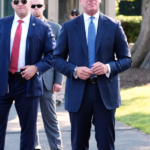Not on the official agenda, at least.
“Jump up to the microphones,” said keynote speaker Aaron Saunders, chief technology officer of Boston Dynamics, inviting a standing-room-only crowd to ask him questions. “And I’m the CTO, so don’t ask me about tariffs.”
At the summit on Wednesday and Thursday, some humanoid makers were looking at a potential bright side to the geopolitical shifts as American businesses look harder for domestic supplies of parts and the development of U.S.-based robots that can automate factories and warehouses.
Al Makke, a director of engineering for Schaeffler’s chassis systems, said tariffs could push many companies toward onshoring production of a variety of items in the U.S.
“And if that does happen, then local companies have to deal with high labor costs and a shortage of labor and so automation gets pushed further,” Makke said. “And one of those faces of automation is humanoids.”
Most of the big industrial robots employed in the U.S. are used to help make cars, and are imported from countries such as Japan, Germany or South Korea.
Automakers in the U.S. installed 9.6% more robots in their plants than a year before, according to new data from the International Federation of Robotics, a trade group.
The sole humanoid at the conference was Unitree’s G1. Marketed for $16,000 and remote-controlled by an employee standing nearby, the robot fluidly shook hands, waved back at people and walked around the show floor, but it won’t be moving totes or working in a factory anytime soon.
“It’s still a very narrow market, but I think there’s still a huge potential market on the industry side, like for manufacturing and factory and even home use,” Yang said.
At a full pickleball court on the show floor, some conference attendees took a break to grab a racket and swing at balls tossed by a wheeled robot. Asked to describe what’s inside the Tennibot robot, its maker also had tariffs on the mind.
“Injection molded parts, rivets, screws, nuts, wheels, motors, batteries,” said Haitham Eletrabi, co-founder and CEO of Tennibot, based in Auburn, Alabama. “The supply chain gets very complex. We get parts from all over the world. Tariffs are adding a lot of uncertainty.”
It’s not just the U.S.-China trade rivalry that was weighing on some attendees. Francesca Torsiello, of the recruitment firm Adapt Talent, said she’s also hearing more wariness from Canadian robotics and engineering candidates about taking jobs in the U.S. amid a tense political environment.
“In the past, people in Canada found it attractive to come and work for U.S. companies; right now they’re being very hesitant,” Torsiello said.









